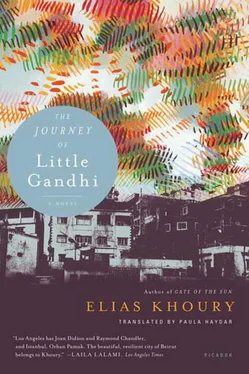“You want people to laugh at the boy?” his son asked.
“Laugh? Why should they laugh? Is Spiro such a horrible name?”
“No, Dad, not horrible, but it’s not for a little boy.”
“What, was I born old? Wasn’t I a little boy once? I was, and my name was Spiro, and I was proud of my name.”
“It’s up to me to call him what I want.”
“You’re not my son, that’s for sure. Your mother must’ve gotten you somewhere else. Is Spiro such a shameful name? It’s after Saint Spirodonius the Miraculous. Your generation is full of shit.”
Spiro warmed up to this grandson. He started teaching him prayers and would read him the “synaxarion.” He’d bribe him with money and chocolate to get him to listen to the stories of Saint Spirodonius the Miraculous, whose saintliness was heralded by donkeys. They slaughtered the two donkeys in the middle of the night and ran away. Saint Spirodonius got up and put their heads, which were dripping with blood, back in their places. In the morning the people believed it was a miracle when they saw the white donkey’s head on the black donkey’s body and the black donkey’s head on the white one’s body. The boy would fall asleep next to his grandfather, and the grandfather would try to read from this ancient book, which he inherited from his grandmother Hanna. He’d put on his spectacles over his large black nose and read the stories of “Ireni.”
“His daughter’s name was Ireni, and he made her speak after she was dead.”
The grandson seemed doubtful and Spiro would read alone, hearing his own voice as it metamorphosed into a voice resembling his grandmother Hanna’s. The same intonation, the same “ahems,” the same grandson, but this one’s name was Nabil, not Spiro. And Spirodonius the Miraculous would be ticked off and would no longer be interested in forgiving the sins of this blasphemous family.
Spiro walked, leaning on the cane in his right hand, with his grandson Nabil walking beside him. He’d walk up and down Hamra Street mumbling in a muffled voice, his grandson unable to hear him. He stood in front of Little Gandhi and spoke with him. The war had wiped out the differences between people, and Spiro with the hat increased his visits and conversations with Little Gandhi. And he didn’t stop visiting him until after they discovered the body of Madame Nuha Aoun the night of September 15, 1980. When it happened, the Assyrian storekeeper Habib Malku said, “They’re murderers and we can’t do anything about it.” But Malku didn’t agree that the situation had anything to do with sectarianism or the feast of the cross. Malku was the one whose grandfather fled from Marsin in 1918 by foot during the massacres in Turkey. He still remembered his grandfather with his swollen feet, speaking in Turkish, his head wrapped in a black cloth. He remembered how he’d sleep sitting up in the bamboo chair.
Malku, unlike his grandfather, never stopped talking. He was the most popular guy in the quarter. He’d roll his r’s and swallow up half of his l ’s as he bragged, saying, “We’re the real Arabs. Al-Akhtal 8was Assyrian. He used to enter upon the Umayad Caliph with wine dripping from his beard … the greatest Arab poet was from the tribe of Taghlib, and the tribe of Taghlib was Assyrian.”
The Reverend Amin, who avidly studied the Ghassanid roots of the Greek Orthodox sect, to which he no longer belonged thanks to his father the cobbler who’d become a Protestant at the hands of the American missionaries, used to make fun of Malku and the way he talked. “The members of the tribe of Taghlib were Arabs, and this guy’s Assyrian. What do you mean, did al-Akhtal recite his poetry in Arabic or Syriac? What, is Syriac Arabic? The world’s gone mad. We are the Arabs. We fled when the Marab Dam collapsed and we came to Huran, and we made a kingdom and allied ourselves with the Muslims. But look at this end we’ve reached. The kingdom has become a dump. Hamra Street has become a dump, and the Assyrian has become the descendent of al-Akhtal!”
Gandhi liked Habib Malku, but he didn’t know how to befriend him. This man, who was one of the best watch repairmen in Beirut, and owned a store in Bab Idriss, wound up buying that store near his house after he lost his eyesight. He turned it into a shop that sold everything from fresh produce to notebooks. The back of the store was filled with old utensils and small kerosene stoves. It became his hobby to collect these antique kerosene stoves that people no longer used and carefully line them up on the shelves in the back of the store.
The night before he died, Gandhi stood for a long time in front of the store, where the old Assyrian was rubbing his hands together and saying, “The war is over. Damn the Jews, but now the Jews are here — who’d have said the Israeli army would reach Beirut. What do we care. Jews? Fine. The important thing is it’s all over.”
Gandhi left the store because he didn’t know what to say. He left the store and walked alone on his final journey, where he met Alice at the Montana. That day Alice didn’t talk much. No one knew what she would’ve said. She was worried about the owner of the Salonica Hotel — that white Egyptian who couldn’t find anywhere except downtown, which was on the verge of destruction, to buy a building and turn it into a hotel. And Alice, who understood the male psyche, figured it out in a flash, from the outset, that this man was running a whorehouse and trafficking hashish. But with the deterioration of things, the hotel became something of a shelter house, a place to sleep for what was left of the Egyptian barmaids, lots of soldiers, and herself. Alice used to say these soldiers are nothing like the soldiers she used to know. She was worried the Israeli soldiers would do something to the hotel owner, and she told the story of Lieutenant Tannous.
“What a catch he was. Gorgeous, and so slim he could slide his body through a wedding ring. Handsome, tall, and elegant; spiffy and à la mode. But what a loss; he turned out to be a sissy. Once they’re in the presence of women, men become women. I understand men,” she said to Gandhi. “In the presence of women men become women. He was a macho man around men, but with women, he was a wimp. And that’s what your son’s like with Madame Nuha.”
Alice’s story with Lieutenant Tannous was a long one. We don’t know where it begins, but we do know where it ends, because Alice tells the end clearly. It’s the beginning we don’t understand well. Maybe it’s because things got all mixed up in Alice’s mind, or because she didn’t want to tell us the truth. This obscure beginning starts with her escape from Shekka. Alice told us she was an only daughter. Her mother died and her father never remarried. He was a fisherman and was always drunk. Here Alice would tell the beginning in classical fashion, for the majority of the prostitutes in our country began their profession after being raped by their fathers. And this is precisely Alice’s situation. She’d talk about a bad childhood, how she started working as a maid at age thirteen, and how she remembers nothing of her father except the way he smelled of fish, and how he used to hit her, and she remembers her loneliness. Back then Shekka was a small village, and the man who was called Abboud Murad spent his time between the sea and gambling. Alice said he raped her, but her memories concerning this subject were muddled, because when he came to her, drunk, in the middle of the night, she felt only a minor pain between her thighs. She felt him on top of her, but went on sleeping just the same. She didn’t know why she didn’t dare let him know she was awake. When he finished, he went back to his bed, which was on the floor next to hers, and she listened to him snore. Alice didn’t leave the house right away after that. She was ten years old and believed the time to leave home would be when she got married. But after what had happened, and she understood what had happened, because she knew all about it, she decided to run away. Then a year later she got her chance. The man was a friend of her father’s, a fisherman, fortyfive years old, older than her own father. He told her he was going to Beirut and asked her to go with him. He said a relative of his had gotten him a job at the port, he had a place to stay, and he wanted to marry her. Alice knew the man was lying to her, but she ran away with him anyway. She lived with him in a small room on Wegand Street and there the whole world opened up for her. She stayed with the man three years. He didn’t marry her, and she didn’t ask him why. She knew when she ran away with him he wasn’t going to marry her. And on Wegand Street she fell into the snares of Abu Jamil, and the world opened up before her. Alice was fourteen, and Beirut was just beginning. Beirut’s nightlife began in the mid-forties, and from there Alice began her journey.
Читать дальше












